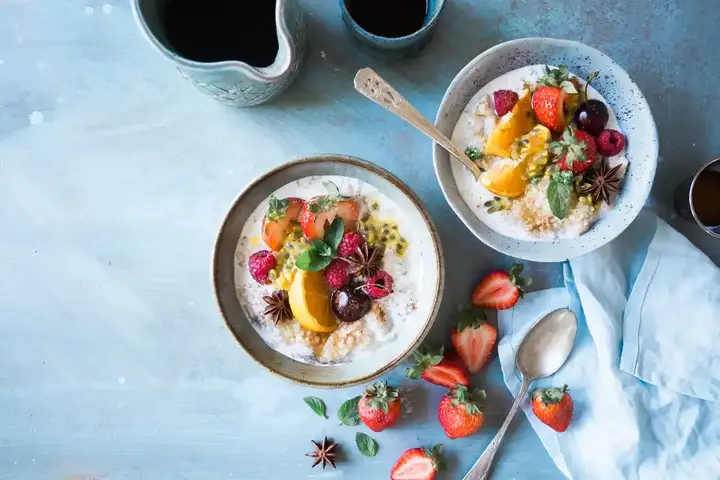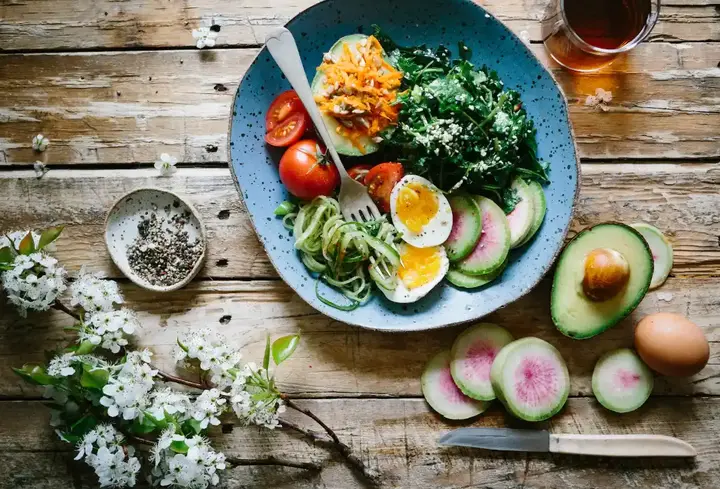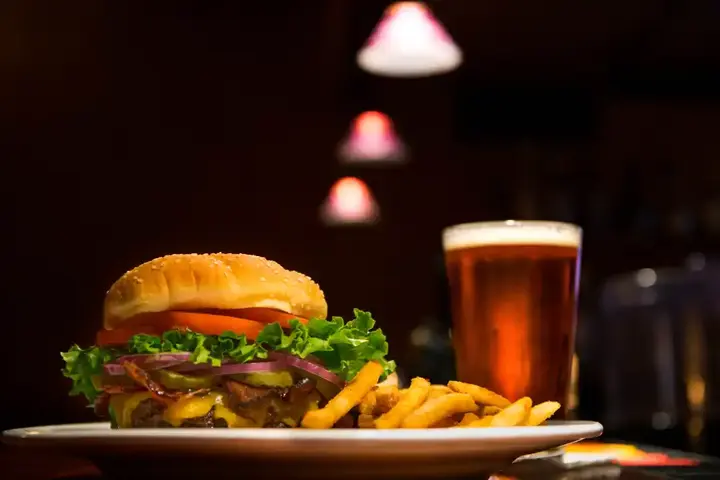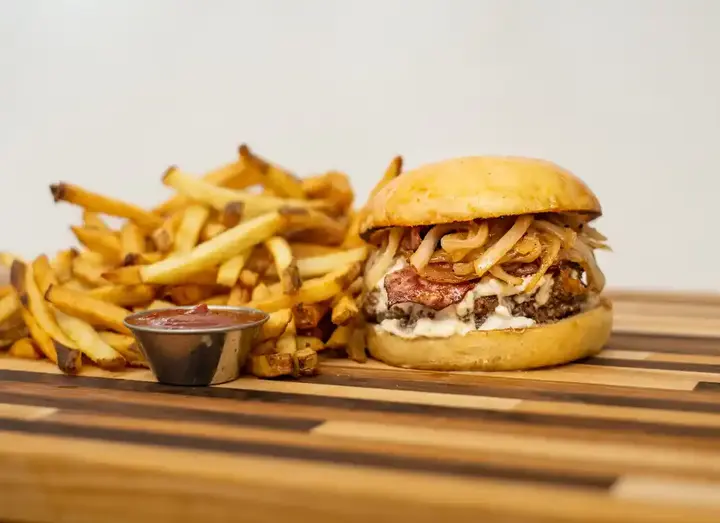What diet is best for a healthy sleep?

The way you eat before bed affects your sleep: this is a piece of information you may know.
Show key points
- Your overall diet throughout the day, not just what you eat before bed, can significantly influence your sleep quality.
- Studies show that poor adherence to dietary guidelines—such as low intake of fruits, vegetables, and whole grains—is linked to shorter and lower-quality sleep.
- Consuming healthy foods rich in melatonin, fiber, tryptophan, and key nutrients like magnesium and omega-3 fatty acids may promote better sleep.
- ADVERTISEMENT
- On the other hand, high intake of saturated fats, refined carbs, alcohol, and caffeine can disrupt sleep patterns and reduce sleep quality.
- Research suggests a complex, possibly bidirectional relationship between diet and sleep, influenced by additional factors like age, gender, and socioeconomic status.
- Regular meal timing and avoiding late-night snacking with unhealthy foods are crucial elements of supporting healthy sleep through diet.
- While no single food guarantees better sleep, maintaining consistent sleep hygiene and following a balanced diet can collectively improve sleep health.
You may have found yourself still awake at two o'clock in the morning, after enjoying a cup of coffee with dessert. But did you know that your all-day food choices may also affect your night's sleep?
In fact, more evidence shows that general dietary patterns can affect sleep quality and contribute to insomnia.
I am a food epidemiologist and trained to look at population-level diets and how they affect health.
In the United States, a large percentage of the population suffers from poor sleep quality and sleep disorders such as insomnia and obstructive sleep apnea, a condition in which the upper airway becomes blocked and breathing stops during sleep. Meanwhile, most Americans eat too many fatty and processed foods, too little fiber, and very little fruit and vegetables.
Recommend
Although it's difficult to determine whether these two trends are causally related, increasing research points to links between sleep and diet and offers hints about the biological underpinnings of these relationships.
How diet and sleep quality can be intertwined

My colleagues and I wanted to gain a deeper understanding of the possible relationship between sleep and diet in Americans age 18 and older. So we analyzed whether people who follow government dietary guidelines for Americans get more sleep.
Using a nationally representative dataset from surveys collected from 2011 to 2016, we found that people who did not adhere to dietary recommendations such as consuming adequate servings of fruits, vegetables, legumes and whole grains had a shorter sleep duration.
In a separate study, we followed more than 1,000 young adults aged 21 to 30 who were enrolled in an online dietary intervention study designed to help them increase their daily servings of fruits and vegetables. We found that those who increased fruit and vegetable consumption over a three-month period reported improved sleep quality and reduced insomnia symptoms.
Research conducted outside the United States by my group and others has shown that generally healthy dietary patterns are associated with better sleep quality and fewer insomnia symptoms. These patterns include the Mediterranean diet – a diet rich in plant-based foods, olive oil and seafood, and few red meat and added sugar – and anti-inflammatory diets, which are similar to the Mediterranean diet but include an additional focus on certain components in the diet such as flavonoids, a group of compounds found in plants, which have been shown to reduce the bioinflammatory makers in the blood.
Food and Nutrient Analysis

Within overall healthy diet patterns, there are many individual foods and nutrients that may be related to sleep quality, with varying degrees of evidence.
For example, studies have linked consumption of fatty fish, dairy products, kiwi fruit, cherries and other berries such as strawberries and raspberries with better sleep.
One common pathway through which these foods may affect sleep is the provision of melatonin, an important rate of sleep-wake cycles in the brain.
High-fiber foods such as beans, oatmeal, and some sources of protein — especially those high in the amino acid tryptophan, such as poultry — are also associated with high-quality sleep. Individual nutrients that may be beneficial include magnesium, vitamin D, iron, omega-3 fatty acids, and manganese. Some foods such as salmon are sources of multiple micronutrients.
Decomplication

One important caveat in much research on individual foods, as well as diet patterns, is that most studies can't easily understand the direction of relationships.
In other words, it's hard to tell if the association is the result of diet that affects sleep, or if it's the effect of sleep on diet. The truth is that it's probably a cyclical relationship, where a healthy diet promotes good sleep quality, which in turn helps promote good eating habits.
With observational studies, there are also potentially confusing factors, such as age and economic status, that may have important links to both sleep and diet.
Foods to avoid for sleep health

Eating more sleep-aiding foods isn't necessarily enough to get better sleep. It is also important to avoid certain foods that may be bad for sleep. Here are some of these foods:
Saturated fats, such as those found in burgers, fries and processed foods, can lead to less slow-wave sleep, which is considered the most rejuvenating period of sleep.
Refined carbohydrates, such as those found in white bread and pasta, are metabolized quickly. If you eat these foods at dinner, they can lead to waking up from hunger.
• Alcohol disrupts sleep quality. Although the calming effects of alcohol can make falling asleep easier at first, it disrupts sleep patterns by shortening REM periods during sleep, which are in the early part of the night, and thus lead to more waking up at night.
Caffeine intake even six hours before bedtime may cause difficulty falling asleep because it blocks the hormone adenosine that promotes drowsiness.
Excessive consumption of calories consistently can lead to weight gain, which is one of the strongest indicators of obstructive sleep apnea, as excess weight is one of the factors because it can put extra stress on the diaphragm and lungs, and can also lead to narrowing of the airway if fat accumulates around the neck and throat.
Interestingly, our group recently showed that toxic substances found in food or food packaging, such as pesticides, mercury and phthalates – chemicals used in the manufacture of plastics – can affect sleep. Since toxic substances can be found in both healthy and unhealthy foods, this research suggests that some foods can contain a combination of beneficial and harmful ingredients for sleep.
Meal timing and gender considerations

The timing and consistency of eating, known as "temporal nutrition" in sleep research, is very likely to help explain the link between healthy diets and good sleep.
In the United States, eating at traditional meal times rather than random snacks has been associated with better sleep. In addition, eating late at night is usually associated with eating unhealthy food — such as processed snacks — and can cause more interrupted sleep.
The last and very interesting part of this puzzle is that the link between diet and sleep often varies by gender. For example, the association between healthy diet patterns and insomnia symptoms appears to be stronger among women. One reason for this may be gender differences in sleep. In particular, women are more likely than men to suffer from insomnia.
Keys to a good night's sleep

In general, there is no single magic food or drink that will improve your sleep. It's best to focus on healthy, holistic dietary patterns throughout the day, with a higher calorie content consumed early in the day.
In addition to avoiding caffeine, alcohol and heavy meals within two to three hours before bed, the last few hours of the day should include other good sleep hygiene practices.
This includes moving away from technology, reducing light exposure, and creating a comfortable and quiet environment for sleeping. Moreover, allowing enough time to sleep and maintaining a constant sleep and wake time is essential.








